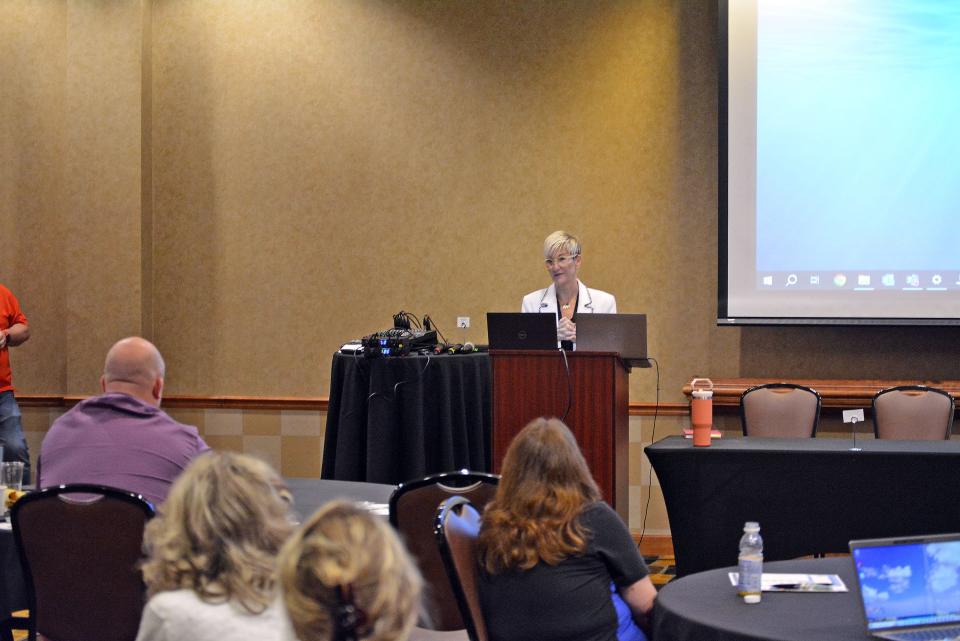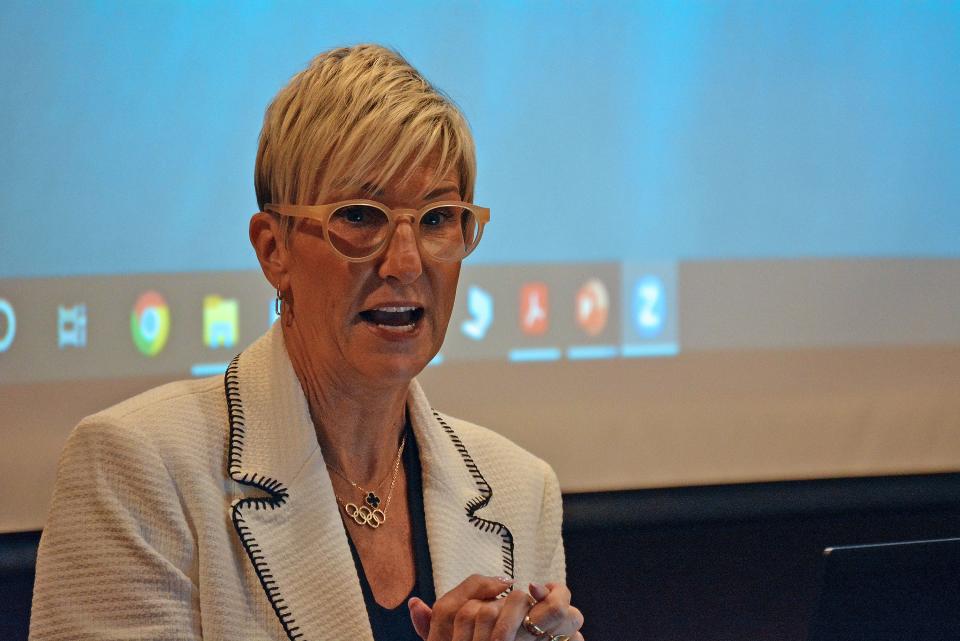She medaled at the Olympics, then struggled with addiction. Now she helps to end stigma
Carrie Steinseifer-Bates was 16 in 1984 and on the world's stage swimming the 100-meter freestyle final at the Los Angeles Olympics. She would go on to tie for the gold medal with her teammate Nancy Hogshead-Makar. Her success and family history eventually would lead to a dark path into alcoholism and a two-year recovery process.
She shared her story Thursday with business leaders from throughout Missouri attending the Recovery Friendly Workplaces conference hosted by University of Missouri Extension at the Hampton Inn and Suites Conference Center in Columbia.
The Recovery Friendly Workplace initiative aims to help businesses decrease costs due to impaired productivity and absenteeism, and improve safety, productivity, and profitability in the workplace by ensuring a company or business has an open atmosphere and works to provide support to employees facing substance use disorder, according to the Missouri RFW website. Businesses can participate in the program to earn a Recovery Friendly Workplace designation.

Steinseifer-Bates toward the end of her address provided a few calls to action to leaders attending the daylong conference. She now works for the organization that helped her achieve sobriety, the Hazelden Betty Ford Foundation.
"Treatment, after care, peer support and stability in my job all contributed to my recovery," she said.
Steinseifer-Bates encouraged those attending the conference to remove barriers to treatment.
"The No. 1 reason people don't get help is not financial. It is shame. Help end stigma by using your voice and your story. Most people are recovering from something. If people in your life don't know you are in recovery from something, tell them. This is how we end stigma," she said. "If you have influence within a business, normalize the discussion around addiction and recovery. Create a safe place that employees can come without fear of losing their jobs."
Steinseifer-Bates entered her sobriety in 2012 after a two-year recovery journey. It would take her four years before she first shared her story.
"The reality is telling stories changes the trajectory and the progress of this disease. Stories change people's lives," she said.
University of Missouri Extension was partnered with the Missouri Chamber of Commerce and Industry, the Missouri Department of Mental Health, the Missouri Department of Social Services, Missouri Rural Health Association, Missouri Hospital Association, Missouri Coalition of Recovery Support Providers and PreventEd, where some panelists and breakout session leaders were from those organizations, for the conference.
A family history

Standing on the podium for the medal ceremony at the 1984 Olympics, hoping she would not forget the words to the national anthem, Steinseifer-Bates said she felt like a fraud.
Five-hour trainings in the pool allowed her to both be alone in her head with both dangerous and safe thoughts.
"The same exact behaviors that allowed me to be the best in the world at something, were the very same behaviors that nearly killed me in addiction," Steinseifer-Bates said.
Her mother was an alcoholic and so she learned from a young age how a person can go about hiding an addiction. There also was the associated trauma of believing that her mother loved alcohol more than she loved her own children, Steinseifer-Bates said, adding she would try to negotiate with her mom about her mother's drinking.
"What I didn't understand was that she was sick. ... What I also felt at a very young age was that I wasn't enough to make her stop, keep peace in the house and for her to care about our family enough to stop drinking," she said.
The deep end of addiction
Four years after her gold-winning performance, Steinseifer-Bates only would be on the Olympic team as an alternate and ended up not competing in Seoul, South Korea in 1988. By this time, she was a couple years into her college days at the University of Texas in Austin.
This also was the first year Steinseifer-Bates would drink to numb her feelings, she said. She was using alcohol to chase that same euphoric high feeling she had in 1984, and she cannot pinpoint when she crossed the proverbial gray line into alcoholism. Not even having her two daughters would give her that feeling.
"The reality is you can never replicate a feeling," she said.
More: Educating healthcare workers about a prescription of drug that reduces alcohol cravings
Steinseifer-Bates would go on to have jobs with Nike and Converse after her college days and giving up on Olympic-level swimming. At that time, drinking was a normal part of life, but Steinseifer-Bates would later realize that drinking and partying would teach her own children something.
"When they see mom and dad having the most fun, we had a drink in our hands. I subscribed very much to the 'Baby on the hip, Wine on the lip' culture. I loved having play dates with moms that would have a drink. I didn't see anything wrong with it," Steinseifer-Bates said.
By 2010, she was talking with a friend on the phone who would go on to call the police for a welfare check because Steinseifer-Bates expressed having suicidal thoughts. Her children were at home asleep when this happened. The police interviewed her children and it was a wake-up call.
"I believe the pilot light to addiction was always lit from the time I was born. I started making the thing click and then the burner went to a slow simmer. Every year that passed I turned (the flame) up. (Alcoholism) is sneaky and incredibly opportunistic. This is the only progressive, incurable and fatal disease that tells us we don't have it," Steinseifer-Bates said.
Entering recovery and beyond
She would enter a recovery program for the first time in 2010 in Oregon, where she lives, soon after the police welfare check. Over the next two years she would enter residential recovery programs four times, the last time at a Betty Ford center in Minnesota. She officially was sober after 90 days.
"This isn't a moral issue. This isn't an issue of strength or weakness. I was a very, very sick woman that needed to get well, not a bad woman that needed to get good. That is the stigma we need to change," Steinseifer-Bates said. "... I hated myself more than anyone could hate me. We can't hate this out of somebody. We can't love it out either."
More: Be Well Bell seen as symbol of hope as 988 mental health line marks one-year anniversary
She would lose her job at 96 days sober. Roughly a month after that, she would lose parental rights for two years.
"(The court) had deemed me likely to relapse because I had gone to treatment so many times. The judge said to me that morning, 'All you have to do is stay sober for two years and you'll get all your rights back,'" Steinseifer-Bates said, adding she asked the judge to not say something like that to a person with substance use disorder. "Two days, two weeks and two months is a miracle. For (him) to say two years, it seemed impossible.
"We made it. It was not just my recovery, it was my children's too."
Steinseifer-Bates' recovery was the hardest thing she ever has done in her life, but it also has brought her the greatest joy, she said.
Charles Dunlap covers local government, community stories and other general subjects for the Tribune. You can reach him at cdunlap@columbiatribune.com or @CD_CDT on Twitter. Subscribe to support vital local journalism.
This article originally appeared on Columbia Daily Tribune: Missouri business leaders learn about Recovery Friendly Workplaces

